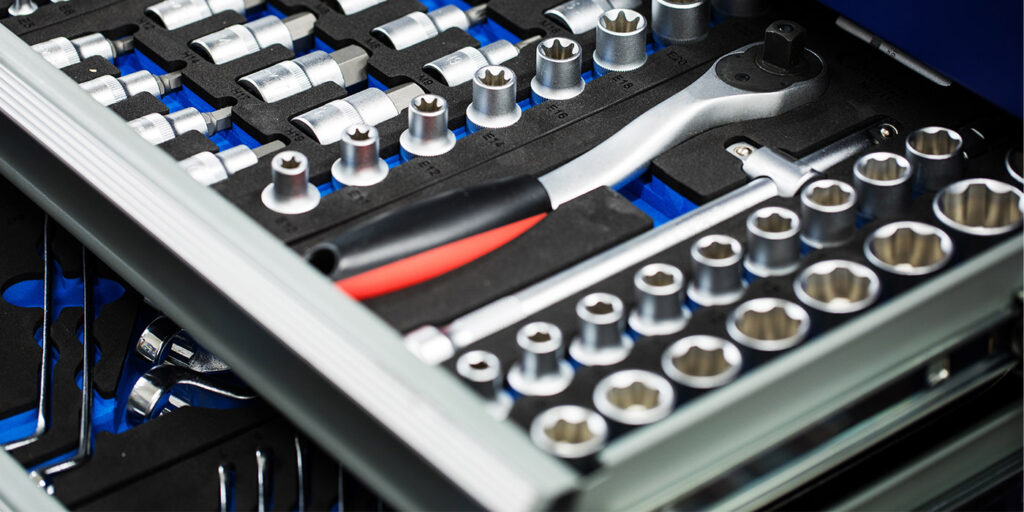Many years ago, I received a decal from a tool supplier, and like dozens of other decals, it got plastered on my rather large toolbox. It reads: “I invest in precious metals, please don’t ask to borrow my tools.” The sentiment sort of sums up how I feel about loaning out my stuff, and given their price tag, it’s pretty darn accurate to compare a good set of wrenches to say, a bar of gold. But, regardless of the brand name or the price point, a properly maintained tool will pay for itself many times over.
You don’t swat a fly with a sledgehammer. The same
goes for using your 3/8-in. drive kit to tackle a 1/2-in. drive job.
From DIYer to Master Technician, most of us start off with a pretty basic socket set, and that set forms the core of our tool arsenal. I’ve owned most of the major brands, and as a counter professional, I’ve also rebuilt (more than) my fair share of ratchets over the years. It’s sad to see the amount of neglect and abuse that a 3/8-in. ratchet endures before it’s tossed across the counter for a free rebuild or replacement. Many of the same folks who use their 3/8-in. ratchet to change engine oil every 3,000 miles religiously seem to forget that a periodic lube job goes a long way for the ratchet, too! Bone-dry or rusty gears, or heads packed with gritty, solidified grease seem to be the norm for these “rebuild” candidates. They are usually the ones that also look like they’ve been used in a pinch as a ball-peen hammer, and I’ve yet to bend a ratchet handle with my bare hands. Maybe I’m doing this wrong, I don’t know…
It begins when you reach into your toolbox, by selecting the correct tool for the job. Getting out the breaker bar when you have a stubborn fastener may seem like an extra step, until you’ve broken a few teeth on your favorite ratchet. Ratchets are designed for speed, not brute force. You don’t swat a fly with a sledgehammer, nor would you shoot an elephant with a BB gun. The same goes for using your 3/8-in. drive kit to tackle a 1/2-in. drive job.
When the job is done, a quick wipe-down keeps ratchets, sockets and extensions ready for the next task, and then they go back into the box. They don’t get left in the driveway, they don’t turn to rust and they don’t get lost. Good storage and organization improve efficiency and keep your tools in top condition, too. If that ratchet didn’t feel quite as smooth as it used to, take a few minutes to field-strip it before putting it away for the day. Check for damage or wear, clean it and give it a dose of an appropriate lubricant. The time to start thinking about replacing a worn tool is before it breaks in the middle of a repair!
Of course, a good deal of “shop work” is done with air tools now, improving our speed and efficiency. Aside from the body shop, where spray guns and sanders require pure, dry, oil-free air to prevent contamination of the refinish job, air tools like impact guns, air ratchets and die grinders rely on a healthy dose of lubricant to keep their motors screaming at peak performance.
The best option is probably the installation of an “FRL” unit, short for “filter-regulator-lubricator.” An air compressor delivers hot, dirty and wet air, which needs to be filtered before it gets to our valuable air tools. Water and oil vapors, as well as any rust and scale that forms inside the compressor or air line plumbing are all harmful to the precision motors inside air tools. The filter of an FRL unit traps these contaminants, while an adjustable air regulator keeps steady air pressure to the tool.
Most compressors cycle on and off at 120-150 PSI in order to keep a reserve supply of air, but many common shop tools operate at a working pressure of about 90 PSI. The lubricator holds a supply of air tool oil that is drawn into the clean compressed air and provides continuous lubrication for the tools downstream of the FRL unit. It also is a good idea to add a few drops of air tool oil directly into the inlet before and after each day’s use.
Like our fancy highly polished hand tools, air tools should be wiped down before storage every night. In fact, air tools are even more susceptible to the grit and grime of the shop environment. Air hoses tend to lay on the shop floor when they aren’t in use, and every time you couple or uncouple an air tool, you are possibly introducing contaminants into the fittings.
And if you’ve ever had an air tool laying just out of reach, you know the temptation of dragging it across the shop floor by the hose until you can reach the tool. Admit it. We’ve all done it. And we wonder why we hear air hissing out of the couplers … which is robbing us of air pressure and tool efficiency every time we hear it.
As with selecting the correct size ratchet, air hose selection and maintenance is critical to proper air tool operation. High-quality couplers and appropriately sized air hoses should be matched to the tools and inspected regularly for leaks or damage.
We’re proud of our tools and rightly so. They are a critical part of pursuing our chosen hobby or vocation, and like other precious metals, fine-quality tools are a status symbol of our achievement. With proper care and feeding, many of our “lifetime warranty” tools are more likely to actually last a lifetime!
This article courtesy of Counterman magazine.













